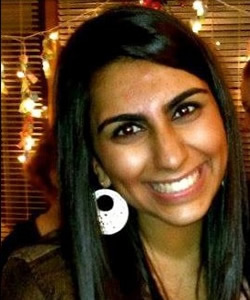Sparking from a discussion between Father O’Brien and Hindu Students
Association (HSA) and Catholic Daughters Presidents Neha Jejurikar
and Abigail Galvan, I became increasingly interested in expanding the
HSA’s interreligious efforts with various Campus Ministry
organizations. As the current Secretary of the Interfaith Student
Council (ISC) and HSA Interfaith Coordinator, this interest soon
turned into fanaticism about the invaluable dialogue waiting to be
shared at a future “dinner and dialogue” event I hadn’t even begun
planning yet with the Catholic Daughters. I wanted to do so much, but
I feared that the goal was of the distant future and remained
ephemeral.
After contacting Kyra Hanlon, the Interfaith Representative of the
Catholic Daughters (CDA), these thoughts dissipated and planning for
the first ever HSA-CDA interfaith dialogue were well under way. Kyra
and I, along with the unforgettable assistance of Lisa Pannucci and
others at Campus Ministry, kept us on track, prepared, and motivated
to make this one of the best events ever.
When speaking with Kyra about our goals for this event, both wanted to
open up a space for dialogue with two religions that would otherwise
typically not interact much. With Hinduism being a non-Abrahamic
faith, the differences seem to cloud underlying similarities within
both traditions. One of these in particular was the role of gender
relations, specifically women, and the dinner seemed like a great
opportunity to come together and discuss issues like attendance during
prayer services, with respect to gender. At a meeting we had before
the dialogue, Kyra eloquently wrote exactly what I wanted to gain from
this experience in our email to send to fellow students, faculty, and
staff: “We hope to learn and grow in faith together”; I think that's
one of the most valuable lessons I have to take away from this event,
beginning to end. Many dialogues interact and share, but this one
allowed us to nurture one another's spiritual beliefs on the basis of
womanhood, which is something extraordinary and to treasure in interreligious dialogue.
The support of Georgetown faculty and staff truly made this experience
memorable for me. We even had two men, who took the reigns for much of
their table’s small-group discussion and provided insights on how
gender relations affect religious identity. At the end of the day, I
feel it is important to recognize so many of the questions we take for
face value in religion and not only reflect on them, but also
discuss the "why’s" with others: why do mothers hold much of the
responsibility to teach their children about faith and spirituality?
How do female stereotypes distinguish each gender’s role during rites
and ceremonies throughout prayer services? What does it really mean to
be men and women for others in the context of religious reverence to
God, someone assumed to be male?
Interestingly enough, these questions lingered in my mind following
the event. It didn’t make sense at first, because I hoped this
discussion would finally answer everything I had wondered about in my
theology classes, and now those questions were only going to be
answered with more? It was then that I realized the importance of
contemplation in action, and how these thoughts should be used to not
only reflect on my experiences thus far at Georgetown but also shape
those to come in the future. Thus, I believe this reflection serves to
not only think about or commemorate the achievements of two religious
organizations on campus but also to make others aware of the paths and
actions that can stem from this simple, yet powerful dinner and
dialogue on women and religion.

